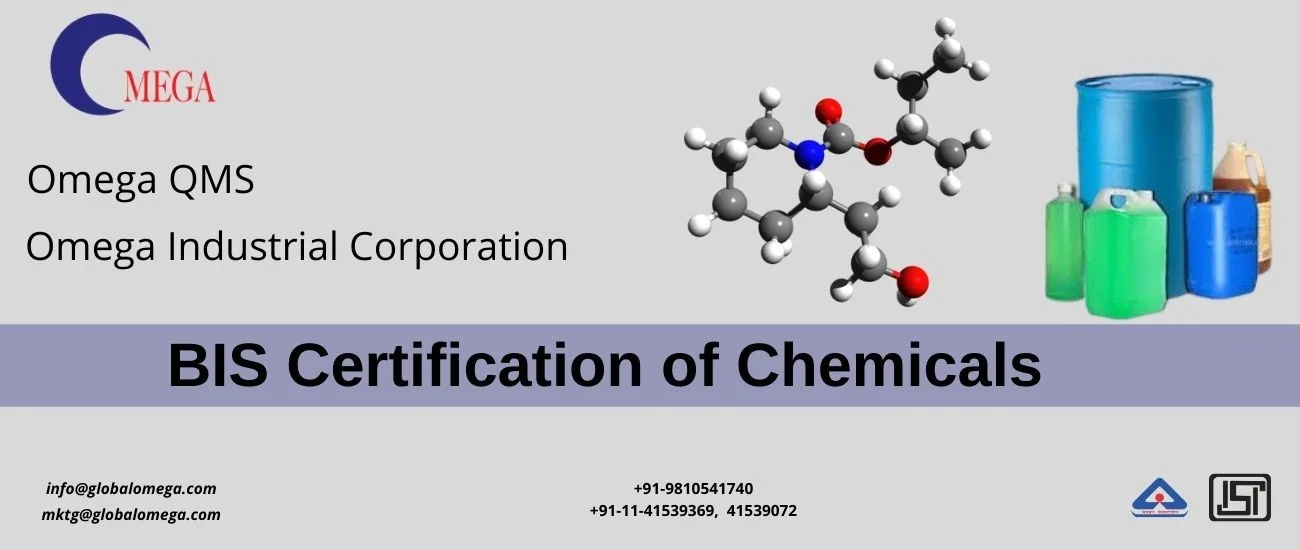BIS Certification of Chemicals

BIS is the National Standard Body of India established under the BIS Act 2016 for the harmonious development of activities of standardization, marking, and quality certification of the products and for matters relevant to or incidental to them. Recently, the Government of India has taken a series of measures regarding the mandatory BIS certification of Chemicals.
According to the procedure for notification, WTO members are invited to comment, if any, within 60 days of the notifications being given. Therefore, concerned manufacturers of the above-mentioned Chemicals, through their respective governments or with the aforementioned authorities, can raise their concerns at the WTO level within given time frames.
Procedure for BIS Certification for Chemical
On notification of these Quality Control Orders, all international suppliers and domestic manufacturers of these products will need to submit an application for certification to the concerned office of BIS. The certification process would also include physical testing and inspection of the related Chemicals in the factory premises as well as independent testing of the same by a BIS own laboratory or accredited laboratory in India. Certification can initially be issued for a period of one year, after which application is to be submitted to BIS for renewal from one year to five years.
For certain Chemicals and Polymers which already fall within the scope of the BIS, the Indian Standards for possible up-gradation or changes are being reviewed. These Chemicals include Acetone, Toluene, Phthalic Anhydride, Ethylene Glycol, and Butyl Acrylate, etc.
What is the use of BIS certification for Chemicals?
BIS being a National Standards Body in India, maintains product quality, safety, and reliability. BIS has established a Central Laboratory, four Regional Laboratories, and three Branch Laboratories in the country to test product samples during preliminary inspections and surveillance operations. Apart from their own laboratories, BIS has granted accreditation to a large number of testing laboratories for testing of samples drawn by BIS officers. The government has notified various products under mandatory BIS certification in the interest of public health, life, and safety. With the implementation of Quality Control Orders for a new set of Indian Standards for various Chemicals, domestic and foreign companies will be required to obtain a BIS license before they can import, manufacture, store, or use the listed Chemicals.
About Omega
We at OMEGA, provide consulting services to the Company and Importers for Chemical products in order to obtain BIS Approval. We have a technically trained and experienced team of professionals to assist the clients. We help companies to develop their products according to applicable BIS specifications. We also support Pharmaceutical and hygiene product manufacturers etc to get BIS Certification for Chemicals and Fertilizers.
In a nutshell, OMEGA helps manufacturers and importers to obtain BIS certification for Chemicals in accordance with government guidelines.
Our services
Our technical and regulatory knowledge, together with our deep business experience, helps our clients strategically manage regulatory compliance and gain a competitive edge over others. OMEGA team brings experts from the chemical industry to help you get your products ready for compliance in a minimum period of time. We have earned a reputation for helping our customers, improving consumer confidence in their brands, and gaining competitive advantage. We can also determine if your products currently require BIS certification for imported chemicals and domestic products in India.
